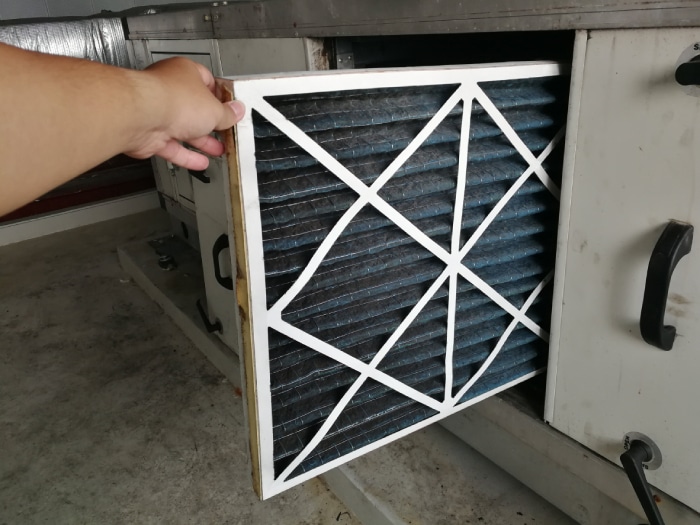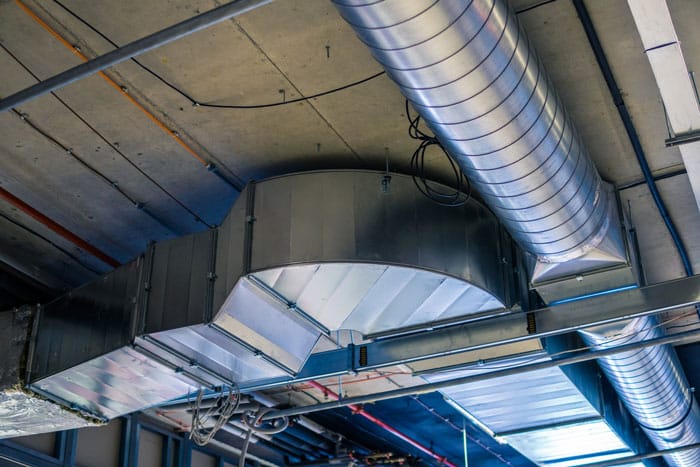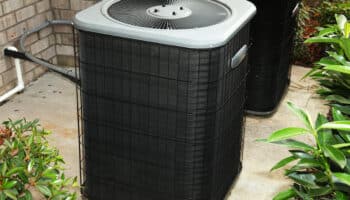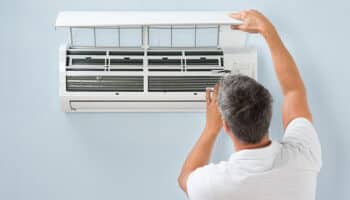We've independently reviewed this article to make sure it's as accurate as we can make it.
To find out more about our article creation and review process, check out our editorial guidelines.
Are you wondering why your central air has two filters?
Don’t worry, this confuses a lot of people. Because all the instructions we hear are about changing your filter. Singular.
Luckily, you’ve come to the right place for answers.
If you live in a large home, there’s a good chance your system requires more than one return air duct. And each duct requires a filter to stop particles before they get to your evaporator or cooling coil. Or, you have a system that has multiple AC units.
Need that explained a little more? Read on!
Circumstances Where an Air Conditioner Needs Two or More Filters
There are different circumstances where an air conditioner needs two or more filters, some of these are:
#1 You Have Multiple Return Ducts
If you live in a larger home, it will impact the design of your HVAC. And there’s a good chance that multiple return ducts will be necessary.
A good rule of thumb is if the AC is a 3-ton or higher, it will most often have more than one filter grill in the house.
A properly designed system needs to pull in as much air as it pushes out through registers and vents. The more rooms, the more supply vents. The more supply vents the greater the need for more return air.
Return air is the air that’s pulled from the house. So it will have all the dust, pet hair, and whatever else is floating around in your air, some of it so small you can’t see it.
You don’t want all that debris entering your system and fouling your evap coil, so there would be a filter for each return duct—but not each vent!
#2 You Have Multiple Central Air Systems
This is something a lot of people wish for, although they probably don’t realize it.
What they do realize is their top floor is significantly hotter than the bottom floor, and they wish for a solution. An expensive solution is a unit for each floor.
If you live in a home with multiple air conditioning units, you’ll need a filter for each.
#3 When There are Two Filter Slots at Your Air Handler
This one seems to be a bit of a mystery. For a while, manufacturers were adding dual slots, but most HVAC pros recommend against using them both. But some don’t.
In many cases, the first filter was a looser weave that would catch larger particles and the second would catch smaller particles. Sometimes one slot would be for a 5” filter and the other for a 1” filter.
In either case, using both could seriously impact your airflow.
Interestingly, while the filter manufacturers are pushing high MERV filters, most seasoned HVAC pros just call them furnace killers.
Components of Your Central AC Unit
To further understand why your central air conditioner requires two or more filters, we’ll explain the components of your system in this section.

For any home that has central air, your system has the following. And please note that I’m focusing on HVAC components that relate to your AC, not necessarily your heat.
Air Handler
Air handlers have been described as the lungs of your system. They don’t heat or cool air, they simply manage the airflow across the evaporator coil, which is housed within.
Air Ducts
If you have an unfinished basement, you know what your air duct system looks like.

These large metal pipes and trunks or flexible ducts distribute the cooled or heated air throughout your home.
Compressor and Condenser Coil
These are part of the outside unit of your air conditioner. The compressor is like the heart, it pumps refrigerant also known as “Freon” (blood) through copper tubes (veins) to the coils (lungs).
It adds or removes heat and brings it back to the compressor, where it is released or absorbed through the use of the outdoor fan.
Please note the above is an extremely simplified explanation that spares us from all the science behind it.
Evaporator Coil
The refrigerant is pumped to the evaporator coil, where it passes through an expansion valve or metering device.
This lowers the temperature of the refrigerant as it flows to the coil, and absorbs heat from your house with the assistance of a blower.
Blower Motor
The blower motor has a big from the filter too.
However, the primary purpose of the filter is to prevent the evaporator coil from getting dirty, which will diminish the heat transfer ability of the coil to give up heat to the refrigerant. The cleanliness of the motor isn’t as important in comparison.
FAQ
Now, we’ll answer some of the most common questions about having a central air conditioner with two or more filters.
Do You Need Filters in Your Return Vents?
Honestly, probably not.
Yes. 9 out of 10 websites will say the opposite, but there might be some monetary gain for them to say that.
HVAC professionals who are simply about the tech and not part of some corporate entity trying to increase revenue advise against the practice.
Your main filter, the one closest to the air handler, is the one doing all the work and catching debris right before it hits the blower motor. If it’s doing its job, you don’t need anything another filter.
Remember, your entire system is built around an amount of airflow. Every filter you add blocks air a bit more. Restrictive airflow will cause the evaporator coil to freeze up.
Once this occurs, not only is your house not cooling as you desire, but it is not boiling off the refrigerant. This will send liquid refrigerant back to the compressor, which could cause damage or failure.
So, filters are absolutely necessary. Where they’re placed may be immaterial—have them at the air handler or the return vents—just make sure what you have isn’t reducing the required airflow that was designed into your system. And know that every system is, or should be, unique to the home it’s in.
Is Having 2 Thin Filters Better Than 1 Thick Filter?
Let’s have a lesson in Cubic Feet Per Minute (CFM) and as it pertains to HVAC. It will be brief because well, math.
CFM is a measurement of airflow volume, which is determined by the amount of air in cubic feet that passes over a stationary point every minute. Each HVAC system will need a specific amount of CFM to work as designed.
So before adding any filter, you need to know that it won’t impact your airflow, because negatively impacting airflow will lessen the lifespan of your equipment—as in it will eventually kill your blower motor.
If you calculate your CFM and your two filters don’t impact your airflow, then sure, use both. Use whatever will allow the airflow you need for your system.
If you are doing this, though, you probably want to work with a professional who can measure how much pressure drop there is across the filter.
Is It Bad to Have Two Air Filters?
If you’ve read this far, you’ve probably come to this conclusion on your own. In many, if not most cases, two in-line filters are not a good idea. Despite what all the people who would like you to buy a filter would have you believe!
As stated above, it’s all going to come down to the amount of airflow your system needs and not reducing it.
Conclusion
Depending on your HVAC system, there may be legit reasons for having more than one filter. For example:
- You have more than one return air trunk
- You have multiple air conditioning units
The most important takeaways here are that you never want to have either a single filter or stacked filters that block out the required airflow for your system.
Also, while it’s typical to see filters at the air handler, you can choose to place them at your return air vents instead.
And yes, many, many sites you read will tell you you need more than one, or that more than one is just fine. That started because of companies wanting to increase sales, and now it just gets repeated as truth.
Remember that too much airflow restriction, whether because of multiple filters or a single high-efficiency filter, will reduce your system’s efficiency and eventually damage it, and increase your energy bills.
Hopefully, this answers your questions about an HVAC system that has more than one filter.
Thanks for reading. While you’re here, why don’t you check out our related topics below?






